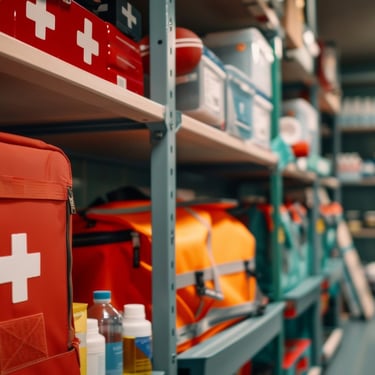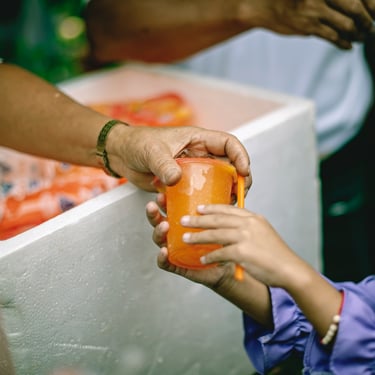BARTERING AND NEGOTIATION:
In situations where money loses value or supplies run low, bartering and negotiation skills become essential.




Whether in post-disaster scenarios, off-grid living, or tight-knit communities, the ability to trade goods and services efficiently ensures you and your family have what you need. Mastering bartering can enhance your resourcefulness and secure vital resources when they’re scarce.
1. Understanding the Basics of Bartering
Bartering is the direct exchange of goods or services without money. It thrives in environments where cash is either unavailable or untrusted. Knowing the value of your items and assessing the needs of others is key to successful trades.
Key Barter Items:
Consumables: Food, water, and medical supplies are always in demand.
Skills: Medical knowledge, carpentry, and repair work are invaluable.
Tools and Equipment: Knives, multitools, and cooking gear hold strong bartering value.
Luxuries: Cigarettes, alcohol, and coffee can serve as powerful trade items.
Actionable Tip: Build a small barter stockpile of items with long shelf lives, like canned goods, batteries, and hygiene products.
Real-Life Scenario: After Hurricane Katrina, residents traded bottled water and fuel for other necessities in neighborhoods cut off from supply chains.
Do: Offer essential items and services to increase your bartering power.
Don’t: Undervalue your goods or appear desperate during trades.
Top Pick: Barterable Goods Starter Pack
Emergency Food Supply Kit – Long shelf life and perfect for bartering during emergencies.
2. Developing Negotiation Skills
Negotiation is more than just trading; it’s about ensuring fair exchanges. Good negotiation can lead to better trades and build long-term trust within communities.
Tips for Effective Negotiation:
Confidence: Approach trades with calm and assertive energy.
Mutual Benefit: Highlight how the trade benefits both parties.
Flexibility: Be willing to adjust offers but know your limits.
Observation: Study the other party’s needs and motivations.
Actionable Tip: Role-play negotiation scenarios with family or friends to sharpen your skills.
Real-Life Scenario: During the 2008 financial crisis in Greece, local markets thrived by allowing people to trade goods and services directly, ensuring everyone’s needs were met.
Do: Establish rapport before negotiating.
Don’t: Rush trades or overlook hidden value in the other party’s goods.
Top Pick: Negotiation Guide
"Never Split the Difference" – A masterclass in negotiation by an FBI negotiator.
3. Building a Barter Network
A strong barter network increases your options during crises. Community connections and trade relationships ensure faster access to necessary supplies.
How to Build Your Network:
Join Local Groups: Connect with prepper communities and local farmers' markets.
Skill-Sharing Events: Offer free demonstrations of useful skills in exchange for future bartering opportunities.
Online Forums: Engage in online forums dedicated to prepping and bartering.
Tip: Start trading small items within your local community to build rapport and trust.
Real-Life Scenario: In Venezuela’s economic collapse, residents formed local barter clubs to trade essential items without relying on currency.
Do: Create win-win scenarios to strengthen trade relationships.
Don’t: Trade with individuals who have a reputation for dishonesty.
4. High-Value Barter Items to Stockpile
Certain items hold universal value in bartering. Stockpiling the right goods can give you an advantage during tough times.
Top Barter Items:
Medical Supplies: Antibiotics, bandages, and pain relievers.
Fuel and Batteries: Always needed for generators and flashlights.
Seeds and Tools: For gardening and food production.
Clothing and Blankets: Essential in cold climates.
Tip: Focus on acquiring items that have indefinite shelf lives or are easy to rotate and replace.
Real-Life Scenario: During the Balkan Wars, antibiotics and first aid kits were some of the most valuable trade items.
Do: Prioritize items people will need consistently.
Don’t: Waste storage space on items with limited use.
Top Pick: Survival Medical Kit
First Aid Kit for Emergencies – Compact, fully stocked, and valuable in any barter situation.
5. Trading Skills and Services
Sometimes, skills hold more value than physical goods. In survival scenarios, being able to offer essential services can secure necessary resources.
In-Demand Skills:
Medical Aid: Basic first aid and wound care.
Repair Work: Fixing tools, vehicles, and clothing.
Hunting and Fishing: Providing food for communities.
Teaching and Training: Offering classes in essential survival skills.
Tip: Develop at least one highly useful trade skill and advertise your knowledge within your community.
Real-Life Scenario: After the 2011 Japan earthquake, people bartered medical services for food and shelter.
Do: Continuously expand your skill set.
Don’t: Oversell skills you don’t possess.
6. Security and Safe Bartering Practices
Bartering can present risks, especially in desperate situations. Establishing secure practices keeps you and your goods safe.
Safe Bartering Tips:
Trade in Neutral Locations: Avoid disclosing your home location.
Bring Backup: Never trade alone in high-risk environments.
Carry Less: Bring only what you need for the specific trade.
Vet Trade Partners: Build trades with trusted individuals first.
Real-Life Scenario: During prolonged blackouts in Puerto Rico, residents formed barter markets in public spaces with security teams present.
Do: Keep a low profile and remain vigilant.
Don’t: Flaunt excess supplies or high-value items.
Top Pick: Tactical Gear
Multifunction Tactical Bag – Perfect for discreetly transporting barter items.
Bartering and negotiation are powerful tools for survival and resilience. By mastering these skills, stockpiling valuable trade goods, and building networks, you increase your ability to adapt and thrive in crises. Start small, practice consistently, and prepare now to ensure you’re ready when the time comes.
Disclaimer:
This site contains affiliate links to Amazon. As an Amazon Associate, I may earn a commission from qualifying purchases. Your support helps keep the site running, with no extra charge to you.
The information provided on this website is for general informational purposes only. While we strive to ensure accuracy and reliability, the content is not intended as professional advice. Always consult with qualified professionals for specific needs or situations.
